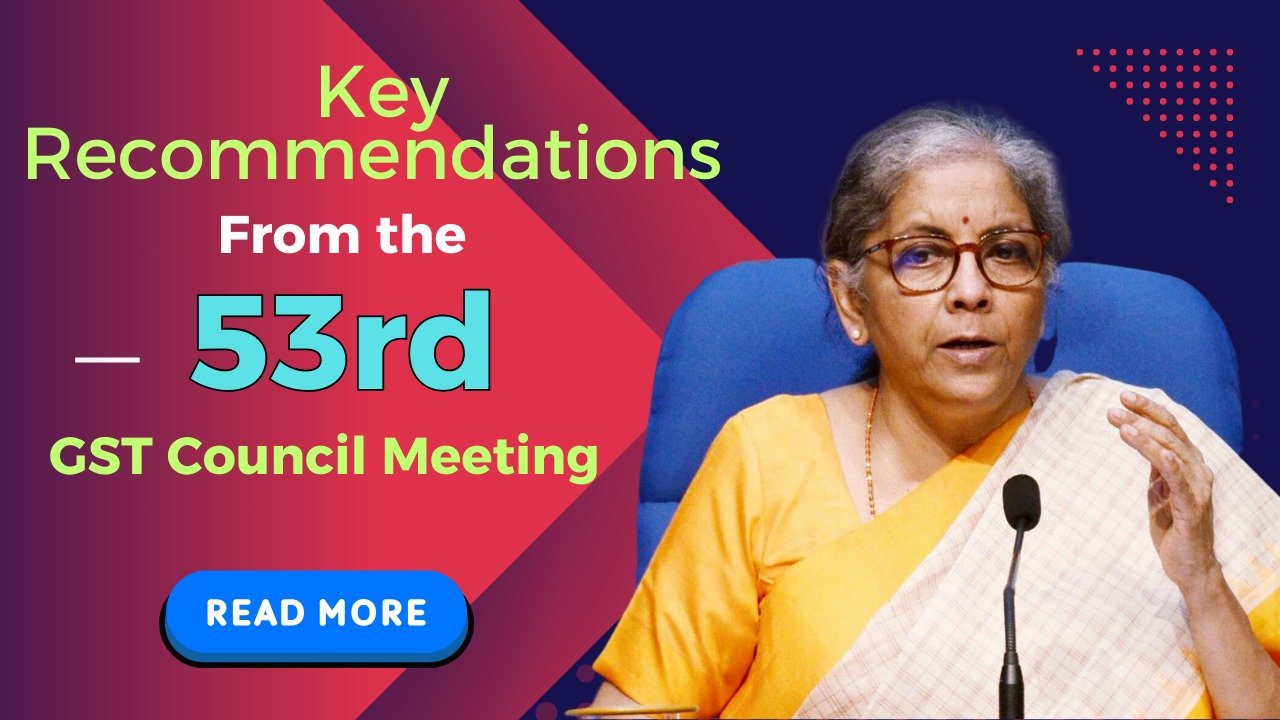Key Recommendations from the 53rd GST Council Meeting
Key Recommendations from the 53rd GST Council Meeting The 53rd GST Council meeting, chaired by Union Finance Minister Smt. Nirmala Sitharaman, brought forth several significant changes and recommendations aimed at simplifying GST compliance, reducing litigation, and providing relief to taxpayers. Let’s delve into the key takeaways from this important session.
Waiver of Interest and Penalties for Certain Tax Periods
Key Recommendations from the 53rd GST Council Meeting The Council has recommended waiving interest and penalties for demand notices issued under Section 73 of the CGST Act. Key Recommendations from the 53rd GST Council Meeting This applies to the fiscal years 2017-18, 2018-19, and 2019-20. However, the waiver is contingent upon the full payment of the tax demanded by March 31, 2025. This move is expected to provide significant relief to taxpayers who faced challenges during the initial years of GST implementation.
Extension of Time Limit for Availing Input Tax Credit
For invoices or debit notes pertaining to the fiscal years 2017-18 through 2020-21, the Council has deemed that the time limit for availing Input Tax Credit (ITC) under Section 16(4) of the CGST Act will be considered as November 30, 2021. This clarification aims to resolve uncertainties regarding the deadline for claiming ITC for these periods.
Monetary Limits for Filing Appeals
In an effort to reduce litigation, the GST Council has introduced monetary thresholds for filing appeals by the Department. The limits are set at:
– ₹20 lakh for the GST Appellate Tribunal
– ₹1 crore for the High Court
– ₹2 crore for the Supreme Court
These limits are intended to focus the Department’s resources on more significant cases, thereby reducing unnecessary legal disputes.
Reduction in Pre-Deposit for Appeals
Key Recommendations from the 53rd GST Council Meeting The Council recommended reducing the quantum of pre-deposit required for filing appeals under GST. This adjustment is designed to ease the financial burden on taxpayers, particularly small and medium enterprises (SMEs), by lowering the amount they need to pay upfront when appealing a decision.
Clarification on Interest Calculation for Delayed Returns
To alleviate the interest burden on taxpayers, the Council has recommended that no interest be charged under Section 50 of the CGST Act in cases where the delayed filing of a return is due to the amount available in the Electronic Cash Ledger (ECL) on the due date. This provision ensures that taxpayers are not unfairly penalized for delays when funds are available.
Sunset Clause for Anti-Profiteering Applications
The GST Council has introduced a sunset clause for the receipt of new applications under the Anti-Profiteering provisions. Effective from April 1, 2025, this change will streamline the process and provide clarity on the timeline for raising such concerns.
Exemptions and Clarifications on GST Rates
Several changes were made to GST rates and exemptions, including:
– SEZ Imports : Exemption from Compensation Cess for imports by SEZ units/developers for authorized operations, effective from July 1, 2017.
– Milk Cans and Solar Cookers : A uniform 12% GST rate will apply to all milk cans (steel, iron, aluminum) and solar cookers.
– Railway Services : Certain services provided by Indian Railways to the general public, such as platform tickets and cloakroom services, have been exempted from GST.
Rollout of Biometric-Based Aadhaar Authentication
To enhance the robustness of the GST registration process, the Council recommended rolling out biometric-based Aadhaar authentication for registration applicants across India in a phased manner. This measure is aimed at curbing fraud and ensuring that only genuine entities are registered under GST.
Conclusion
The 53rd GST Council meeting’s recommendations reflect a continued effort to simplify the GST regime, reduce litigation, and provide relief to businesses and taxpayers. By addressing key concerns from the initial years of GST implementation and making adjustments to the compliance framework, the Council is working towards a more efficient and taxpayer-friendly system. As these recommendations are implemented, taxpayers are advised to stay informed and make necessary adjustments to ensure compliance and take advantage of the relief measures.
For More Information : https://taxgyany.com/

